Dandelion root is an herbal extract that’s used to treat gastrointestinal problems, fight inflammation and oxidative damage, and treat bloating and excessive water retention.
It’s derived from the common dandelion plant, but the dandelion root herb has a long history of use in traditional and folk medicine as a remedy for stomach pain, boosting longevity, and for use in detox regiments thanks to its diuretic effects.
We’ve reviewed and ranked the ten best sources of dandelion root, plus dug in-depth on the science behind dandelion root supplements. Read on for more.
Research
Rankings
1. Oregon’s Wild Harvest Dandelion Root
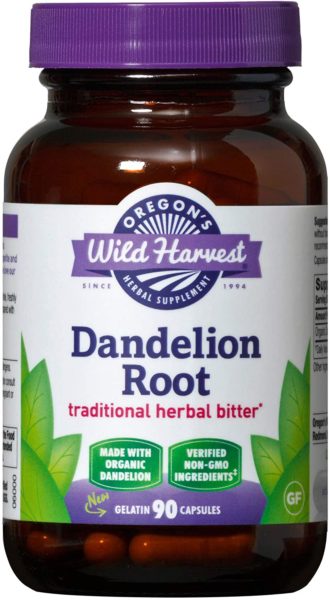
Oregon’s Wild Harvest Dandelion Root is one of the few capsule-based dandelion root supplements that is certified organic.
With capsules made from the plant-derived binder pullulan and zero additional ingredients, it’s an excellent way to add dandelion to your supplementation without worrying about purity or unnecessary ingredients.
Thanks to the high quality of the ingredients and the clean supplement design, it’s our top pick.
2. Feel Good Organics Dandelion Root
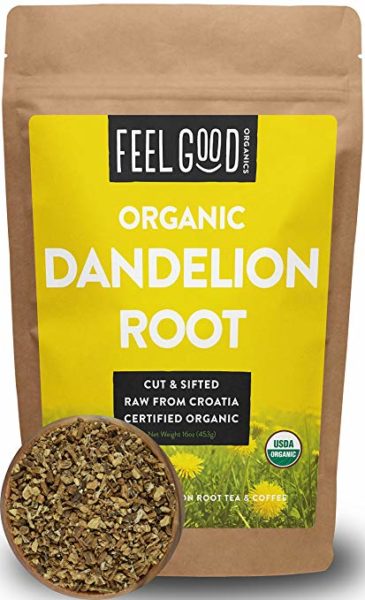
Looking to graduate from capsule-based dandelion root supplements but intimidated by giant two-pound bulk bags? Look no further than Feel Good Organics Dandelion Root.
This is an organically certified loose-leaf source of dandelion root that still comes in a smaller package.
At only four ounces in each packet, it’s great if you are only using dandelion root for a short detox or you want to try out making dandelion tea before committing to a bulk buy.
3. Starwest Botanicals Raw Dandelion Root Tea
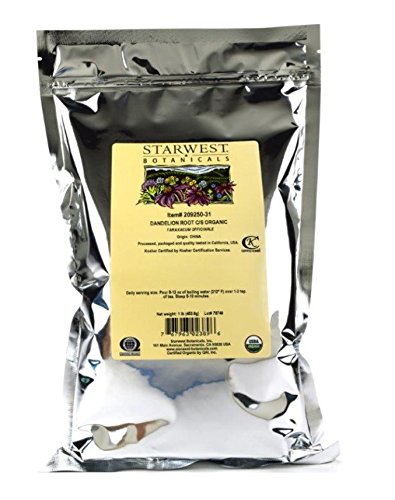
Starwest Botanicals shines for those who want to mix and steep their own dandelion root tea, or for those who want to make their own dandelion tinctures.
Tinctures are tricky, but making dandelion tea is quite easy. The only downside to this approach is shared across all bulk dandelion supplements―it is a lot harder to estimate your dosage and to take a reliable and consistent dose day to day.
That aside, this organically-certified bulk dandelion root is great if you want to prepare your own supplements.
4. Nature’s Way Dandelion Root
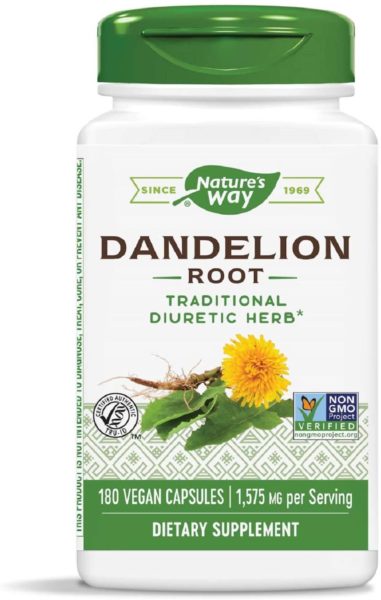
When it comes to simple and pure dandelion root supplements, Nature’s Way Dandelion Root is one of the best. It provides 525 mg of raw dandelion root in a vegan-friendly cellulose capsule.
Aside from a bit of magnesium stearate for stability, there are no additional ingredients, so for a solid dosage without any unnecessary extras, it’s a great choice.
5. PureNaturals Herbs Dandelion Root
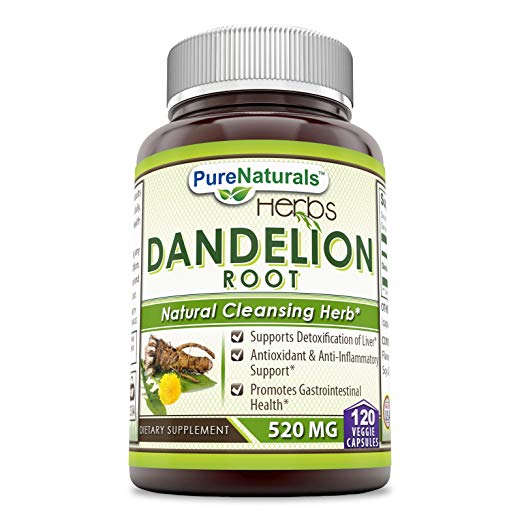
PureNaturals Herbs Dandelion Root is a fairly standard dandelion root supplement with 500 mg of plant material per capsule.
Despite the fact that this dandelion root supplement doesn’t offer much that other competitors don’t, the capsule design is pretty clean, so it’s still a good pick.
6. Traditional Medicinals Roasted Dandelion Root
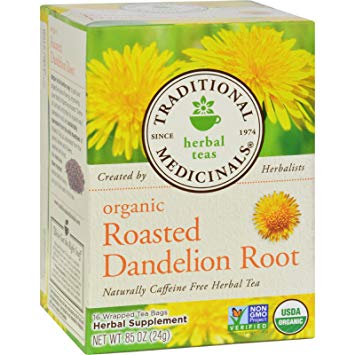
Traditional Medicinals Roasted Dandelion Root is an extremely popular source of pre-made dandelion tea, already packaged into tea satchels.
Unlike some of its other competitors, this dandelion tea is roasted, which gives it a toasted flavor that’s more similar to “real” teas, but at the downside of potentially destroying some of the biologically active compounds in the fresh plant material.
Look elsewhere if you want to maximize the concentration of herbal compounds in your dandelion root, but it’s good for occasional users who want something premade and ready to go.
7. Nature’s Answer Dandelion Root

Nature’s Answer Dandelion Root is a tincture-based source of dandelion root.
The concentration is calibrated such that every two milliliters of solution is equivalent to 2000 mg of raw plant material—or at least the soluble compounds dissolved in glycerin and water.
The solution is alcohol-free, but it shares the same disadvantages of most liquid concentrate supplements: measuring out precise doses is difficult compared to using capsules.
8. NOW Dandelion Root
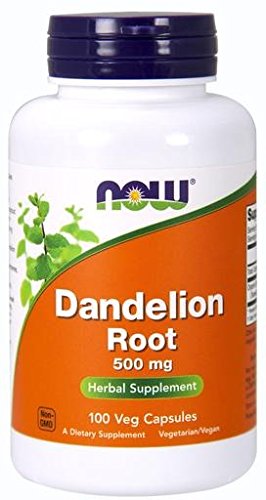
NOW Dandelion Root is a fairly standard capsule-based dandelion root supplement.
It uses cellulose capsules to deliver a dose of 500 mg of dandelion root, though purists won’t like the inclusion of silica as a binder and stabilizing agent.
If a moderate dosage in a capsule is all you’re after, though, it still fits the bill.
9. Frontier Bulk Dandelion Root
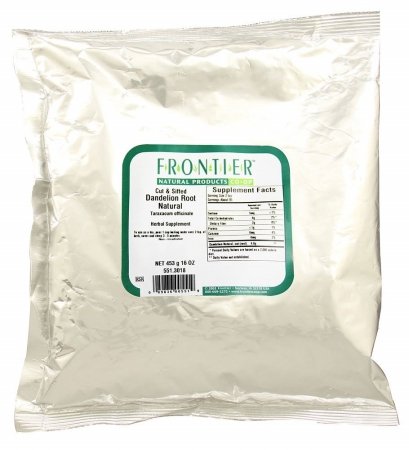
Frontier Bulk Dandelion Root is one option for bulk dandelion root, and while it offers a decent product, it’s largely outclassed by other competitors which offer perks like organic certification and more detailed information on sourcing.
Though it’s one potential option for bulk users, most will want to look elsewhere.
10. Raw Organic Dandelion Root Tea
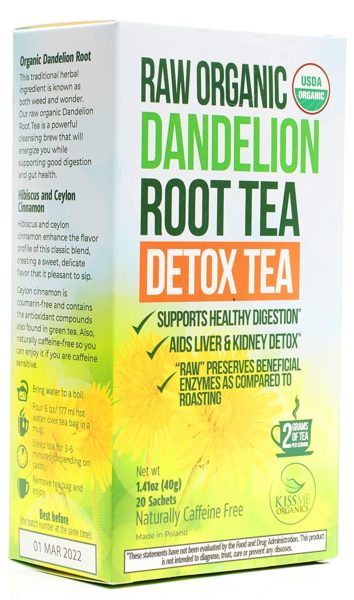
Raw Organic Dandelion Root Tea isn’t quite up to the standard of other dandelion teas in terms of purity or dosage, but it does have one advantage: convenience. These tea bags make it quick and easy to make dandelion tea, so if ease of use is your priority, it’s a decent pick.
Category winners
Best dandelion root overall: Oregon’s Wild Harvest Dandelion Root
For an all-around pick, Oregon’s Wild Harvest is our favorite thanks to its use of certified organic dandelion root in an easy-to-use, vegan-friendly capsule that’s got a respectable dosage. If you want capsule-based dandelion root, this should be your first choice.
Best dandelion root for water retention: Oregon’s Wild Harvest Dandelion Root
Harnessing dandelion root’s diuretic effects is easy with Oregon’s Wild Harvest. The capsule form means you get a solid dose that’s easy to take on a regular basis, and the organic certification doesn’t hurt either.
Best dandelion root for tea: Feel Good Organics Dandelion Root
You can’t go wrong with Feel Good Organics when making dandelion root tea. This loose-leaf cut and sifted dandelion root won’t leave powder sediment, and to top it off is certified organic, so no synthetic pesticides will be seeping into your tea either.
Best dandelion root for bloating: Nature’s Way Dandelion Root
For serious bloating, Nature’s Way delivers a dose of over 500 mg of dandelion root per capsule. If you are looking to use dandelion to expel excess water that’s causing bloating, this should be your choice.
Best dandelion root for women: Oregon’s Wild Harvest Dandelion Root
Our overall top pick is also a great choice for women—whether you have bloating, cramping, or are looking to jump-start weight loss, Oregon’s Wild Harvest is a strong, versatile pick.
Best organic dandelion root: Feel Good Organics Dandelion Root
Feel Good Organics is free of pesticides and herbicides, and moreover, the loose-leaf form means that you don’t even have to worry about additives from capsules, binders, or stabilizers. If you want your dandelion root as pure as possible, FGO is a prime choice.
Who should buy dandelion root?
Dandelion root is great for individuals of all ages, especially those suffering from water retention and high blood pressure. Dandelion root is also great for those looking for a more nutritionally balanced diet, as it provides a wide array of fo vitamins and minerals.
Dandelion root should not be consumed by pregnant women or children unless directed by a healthcare professional.
How we ranked
Dandelion root comes in 2 main forms: tea and capsules. No matter what form it came in, we made sure all the top-ranked products on our list, like Oregon’s Wild Harvest, were certified organic. Dandelion root is exposed to an enormous amount of fo pesticides and chemicals, which we did not want in our bodies – especially in concentrated doses.
In capsule form, we preferred dandelion root products like GNC Herbals, which came in doses of at least 500 mg, as that is the minimum effective dosage according to various studies. There was no set dosage for teas, powders, and extracts. Veggie based capsule products, like Nature’s Way, were ranked higher than their gelatine counterparts because they fit more lifestyles.
Of all the dosage forms, capsule products, like NOW Dandelion Root, were preferred due to their wide availability, and more importantly, their dosage accuracy and scientific backings.
Benefits
Dandelion root can be used as a supplement or infused into tea. Dandelion root is an herbal extract from the familiar dandelion plant that’s used to make tea, tinctures, and supplements for treating gastrointestinal pain, improving risk factors for chronic diseases like cardiovascular disease, and as a part of a detox routine.
Each of these uses has sparked a range of scientific research into the biological mechanisms behind dandelion root potential health benefits.
Dandelion root could help decrease risk factors for cardiovascular disease. Dandelion root contains some strong antioxidants, and many other supplements that contain high levels of antioxidants have proven to be effective agents for improving risk factors for heart disease, like high cholesterol levels.
Research into dandelion root has explored this possibility, with promising results. One study published in the International Journal of Molecular Sciences in 2010 by researchers in South Korea used a rabbit model to study whether dandelion root could help decrease risk factors linked to cardiovascular disease (1).
The study involved several groups of rabbits: a control group which received a normal diet, then three experimental groups which consumed a high-cholesterol diet designed to induce heart disease.
Two of these three high cholesterol diet groups also had dandelion root or dandelion leaf added to their diet.
The researchers tested the levels of blood lipids after the treatment period ended, and found that both the dandelion root and the dandelion leaf groups fared much better with regards to their blood lipid levels.
Further investigation showed that the dandelion groups had better profiles of antioxidant enzyme activity in their blood, which the researchers interpreted as providing evidence for a link between the antioxidant properties of the active ingredients in dandelion and its apparent cardioprotective effects.
The antioxidant effects of dandelion root may help protect your liver. Your heart isn’t the only organ that is negatively affected by oxidative damage; one of the major sources of liver deterioration is oxidative damage.
While a lot of things can cause liver damage, one attractive experimental model is heavy alcohol consumption, because alcohol causes well-characterized and reliable damage to the liver, much of it through oxidative damage.
One study published in 2010 in the journal Food and Chemical Toxicology used mice exposed to large amounts of alcohol to study the ability of dandelion root to protect the liver from alcohol-induced damage (2).
All of the mice had a large amount of alcohol administered, but some of the mice had been given a dandelion root extract beforehand (made with hot water and raw dandelion root material, just like dandelion tea).
The researchers found that the mice given the dandelion root extract had a significant reduction in the amount of oxidative damage to their liver after the alcohol was administered, which suggests that dandelion root’s antioxidant effects also protect your liver from damage.
Other research has connected dandelion root with resistance to the development of fibrosis in the liver. The development of fibrous deposits in the liver is one of the hallmarks of liver damage.
One study published in the Journal of Ethnopharmacology by researchers in Croatia was able to show that an extract from dandelion protected mice livers from damage from carbon tetrachloride, a known liver toxin (3).
This finding highlights the possibility that the liver protection benefits of dandelion root might not be limited to merely the damage associated with alcohol consumption.
This finding hasn’t been lost on supplement manufacturers, many of whom include dandelion root in detox tea and other cleansing and detoxing routines.
Dandelion root can be used as a diuretic to reduce water retention. One of the primary herbal medicine applications of dandelion based extracts has been treating gastrointestinal symptoms like bloating.
A possible explanation for these applications could be dandelion root’s diuretic effects, which modulate your body’s water balance and decrease your water retention.
A pilot study published in 2009 in the Journal of Alternative and Complementary Medicine was the first scientific report to quantify the diuretic effects of a dandelion supplement (4).
The study involved measuring the urine output of a group of volunteers, first over a two day period with no supplementation to establish baseline levels of water balance. Then, the subjects took a dandelion extract twice during a 24 hour period and their urine output was studied that day and the day after.
The researchers found that all 17 people in the study had increased urine output in the first five hours after taking the dandelion extract, and urine output increased again after the second dose of dandelion extract.
These findings provide evidence that dandelion root extract can be used to control your body’s water balance, so if you have bloating or extra water retention, dandelion root might be able to help.
Dandelion root has been studied for its ability to decrease your body’s absorption of dietary fat. Due to the high energy content of dietary fat (twice that of carbohydrates and protein), fat has been a popular target for supplements and interventions designed for weight loss.
While there aren’t any direct human studies on dandelion root supplements for weight loss, there has been some interesting research on a potential biological mechanism that dandelion root extract could use to help promote weight loss.
A study published by researchers in Korea looked at the ability of active compounds in dandelion to inhibit the enzyme pancreatic lipase (5).
This is the same enzyme that is targeted by Alli and a few other weight loss pills, because it is responsible for breaking down fat in your digestive tract.
If this breakdown is prevented, the amount of calories your body absorbs is decreased, even if your dietary intake doesn’t change.
The Korean study found that dandelion extract contains compounds which decrease the activity of pancreatic lipase, which suggests that it might be helpful for reducing the amount of fat your body absorbs from your diet.
While this needs to be tested in a human trial, the finding is nevertheless promising and suggests that dandelion might be used in more weight loss supplements in the future.
Side effects
Broadly speaking, dandelion root extract appears to be fairly safe and well-tolerated, though there have been very few direct studies in humans.
According to a review in the Journal of Herbal Pharmacotherapy, dandelion root has been found to be nontoxic in animal studies (6).
In humans, the same report states that side effects can include allergies, eczema, or increased sun sensitivity, but these are the result of direct skin contact, not consumption.
A few experts report that stomach discomfort, heartburn, and diarrhea can result, but these side effects have not been reported in scientific studies.
Recommended dose
The same review in the Journal of Herbal Pharmacotherapy describes a range of recommended doses, though these are derived from expert opinions and not controlled research studies (7).
For adults, the document recommends doses of 2 to 8 grams of dried dandelion root material. Often, these are made by infusing the raw plant material in hot water and drinking it like tea.
Research studies so far have mostly studies animals, so direct dose equivalents are difficult to compute.
FAQ
Is dandelion root good for you? Dandelion root is not just used as a home remedy for a range of health conditions and diseases, but it is also recognized for its impressive nutritional content. Dandelion root is rich in vitamins, especially A, K, C, and B and is believed to contain as much as 649% and 338% of the recommended daily intake for Vitamin K and Vitamin A, respectively.
Dandelions also have decent levels of fiber (9%), iron (39%), calcium (19%), and carbohydrates (7%) per 100-gram serving of the plant. Given these values, it is evident that dandelion root can be a great addition to any diet lacking in vitamins and minerals.
Is dandelion root edible? Yes, while the entire dandelion is actually edible, you probably wouldn’t want to go out into the yard and eat all the dandelions for their roots. The more common ways to consume dandelion root are through capsules, powder, tea, and liquid.
Is dandelion root a stimulant? Despite the dandelion root’s ability to provide some stimulant-like side effects, the product itself is not a stimulant. Some reports show that dandelion root may boost metabolism, increase appetite, and provide a boost to the functioning of the gastrointestinal system. If consuming dandelion root in the form of tea, there is a chance that there would be added caffeine, which is a stimulant. In that case, you might experience more stimulant effects like jitteriness, increased heart rate, and greater energy.
Can dandelion root lower blood pressure? The major reason that dandelion root is linked to lower blood pressure is because of the diuretic effect that the product induces. Diuretics, in general, work to reduce the fluid within the body, usually through urination. Through this output of fluid, the body loses sodium and reduces its overall blood volume. The reduction in sodium and blood volume can ultimately lead to lower blood pressure in the short-term. With that said, it is important to note that the lower blood pressure resulting from usage of dandelion root is connected to the diuretic effect the root causes and not because of the actual contents of the root itself.
How much dandelion root can you consume in a 24 hour period?
The amount of dandelion root that you can consume per day depends on the method of consumption. If you’re taking dandelion root capsules, the bottle may suggest consuming 1 to 3 capsules per day at 520 milligrams each. In regards to consuming dandelion and dandelion roots as a vegetable, you likely will be unable to eat enough to cause negative effects on the body. Recommendations for tea consumption are generally three or fewer cups of dandelion tea per day, though this would vary based on the concentration of the tea.
What does dandelion root look like? The dandelion root itself appears just as other plant roots do.
Can you buy dandelion root in stores? No, you won’t find dandelion root in its natural form in stores or online. Most dandelion products sold online are powder, liquid, teabags, or capsules.
What does dandelion root taste like? Dandelion itself is often praised for its taste when cooked and eaten, similar to vegetables (flowers, stem, leaves). The roots, when used to create tea products and powder, taste much different than the remainder of the plant. Most would consider the dandelion root to taste relatively bitter. Others have suggested that dandelion root, when roasted and consumed in the form of tea, tastes similar to coffee.
Where can you buy dandelion root? You can either find dandelion root on your own by picking dandelions outdoors, or you can purchase dandelion root and its associated products online. The most common forms that you will see the dandelion root in when available for purchase are capsules, powders, tea bags, and even liquid form. For the most part, the companies selling dandelion root and dandelion root tea are health and wellness companies that specialize in such products, though you may be able to find some products on websites like Amazon and Walmart. Given the fact that dandelion root and its products are not extremely popular, you most likely won’t find these products in stores.
What are the side effects of using dandelion root? When consumed in normal or recommended amounts, dandelion root should not have any side effects unless you are allergic to the plant. One of the greatest risks that come along with dandelion consumption is related to consuming dandelions that you picked yourself. It is possible that these dandelions were, at some point, treated with fertilizers or pesticides, which could potentially cause a negative reaction both internally and externally.
When using dandelion root to treat skin conditions, you are more likely to experience a reaction on the skin when using dandelion topically (similar to an allergic reaction). Because of the diuretic effect that may result from dandelion root consumption, you may experience lower blood pressure, affected blood clotting, headaches, and dizziness.
Is dandelion root a diuretic? Both dandelion root and dandelion leaves have been studied for their potential diuretic effect in humans. One study, in particular, recognized that, though the root is less effective as a diuretic when compared to the leaves, the entire plant can be viewed as producing a diuretic effect. The study noticed that after receiving a dosage of dandelion extract, study participants urinated more frequently within a five hour period (8).
Can dandelion tea help you lose weight? The reason you might notice a lower number on the scale after consuming dandelion tea is because of the product’s diuretic effect. When urine output significantly increases, the body begins to lose water weight. Technically speaking, you are losing weight if you are losing water weight, but it is not the same weight that you likely are intending to lose, which is body fat. You should not depend on the dandelion root or dandelion tea to assist in your weight loss endeavors and should practice eating a healthy diet and exercising to achieve more guaranteed results.
What can dandelion root be used for? Dandelion root has been studied relatively often to determine the health effects it may have on humans. One study tested the effects that dandelion root may have on cholesterol and antioxidant effects and found that dandelion root may produce antioxidant and hypolipidemic (cholesterol-lowering) effects (9).
Dandelion root has also been linked to a decreased diagnosis of Type 2 Diabetes as well as a possible treatment for the condition. The potential for this claim is huge, considering the rates at which Americans are being diagnosed with Type 2 Diabetes (10).
The possible health benefits of dandelion root are often unsubstantiated by medical science but are backed by reports of many consumers. Some mild benefits of dandelion root include increased appetite, treatment of skin conditions like acne and eczema, decreased blood cholesterol levels, and treatment of gastrointestinal disorders.
Can you eat raw dandelion root? No, raw dandelion root is completely edible. At some point, the plant may have been exposed to fertilizers or pesticides, which could potentially cause health side effects.
How much dandelion tea can you have per day? Though it all depends on what your health goals are, the general recommendation is to consume fewer than three cups of dandelion tea per day. Consuming dandelion tea or other dandelion products in larger amounts can result in negative health side effects like gastrointestinal upset, low blood sugar, and excessive loss of water weight. Like most health products and supplements, consuming more than the recommended amount will not necessarily drastically increase the health benefits provided.
Which part of the dandelion can be eaten? The entire dandelion is edible, including the roots, stem, flower, and leaves. In fact, dandelion is used as an ingredient in many foods and dishes more than you think. You can even eat dandelions the way you would eat regular vegetables, including steaming, boiling, or sauteing.
Is dandelion root good for the liver? The effects of dandelion root impact the gastrointestinal tract and can be used as a home remedy for many conditions. While it has yet to be confirmed by official studies or medical professionals, many depend on the dandelion root to assist in liver detoxification. The reason dandelion root may result in liver detoxification is that it could lead to greater bile production in the liver. As bile levels in the liver increase, digestion is improved, and liver functioning is impacted positively.
What is a dandelion? Dandelions are scientifically known as Taraxacum and are completely edible and a valid food source for humans. However, you most likely know of the dandelion because of its role as an invasive species and weed in your garden or backyard.
In addition to being used for their yellow pigment, which is used as a dye in some circumstances, the dandelion is also an effective food for wildlife, a source of rubber and latex for humans, and encourage pollination in large farms and gardens.
How do you make dandelion tea? While not the most popular tea, dandelion tea is becoming increasingly more common due to its potential health benefits in humans. If making the tea from scratch at home, you’ll need to pick some dandelions and rinse them thoroughly to rid them of debris and potential bacteria. You will combine the dandelion with water and bring the mixture to a boil. After letting the solution sit for hours, drain the dandelion from the mixture.
It’s more likely that, if you’re drinking dandelion tea, you are purchasing the tea or tea mixture premade. Dandelion tea comes in many variations when sold online, which includes a roasted version, combination of dandelion leaf and root, and green tea fusion. Depending on the manufacturer that you purchase from, you may be able to choose between tea powder and teabags.
Related Articles
Recap
Dandelion root is an herbal supplement that is still in the early stages of development, but there is evidence that suggests it exerts strong antioxidant and diuretic effects.
The antioxidant properties of dandelion root might be useful for reducing risk factors for cardiovascular disease and for protecting your liver from damage, oxidation, and fibrosis.
Some laboratory-based research even suggests that dandelion root contains compounds that can inhibit your body’s absorption of dietary fat by blocking a specific enzyme, so it could be useful for weight loss too.
Side effects are rare and mild, and can include gastrointestinal discomfort, diarrhea, and heartburn. Dosage recommendations are currently in the vicinity of two to eight grams of dried dandelion root per day, often infused in hot water to make tea, but these recommendations are derived from expert opinion, not scientific data.
As more research emerges on dandelion root, we’ll get a clearer picture of how it can be used for health and well-being, but the initial results are promising.
For BodyNutrition’s #1 dandelion root recommendation, click here.